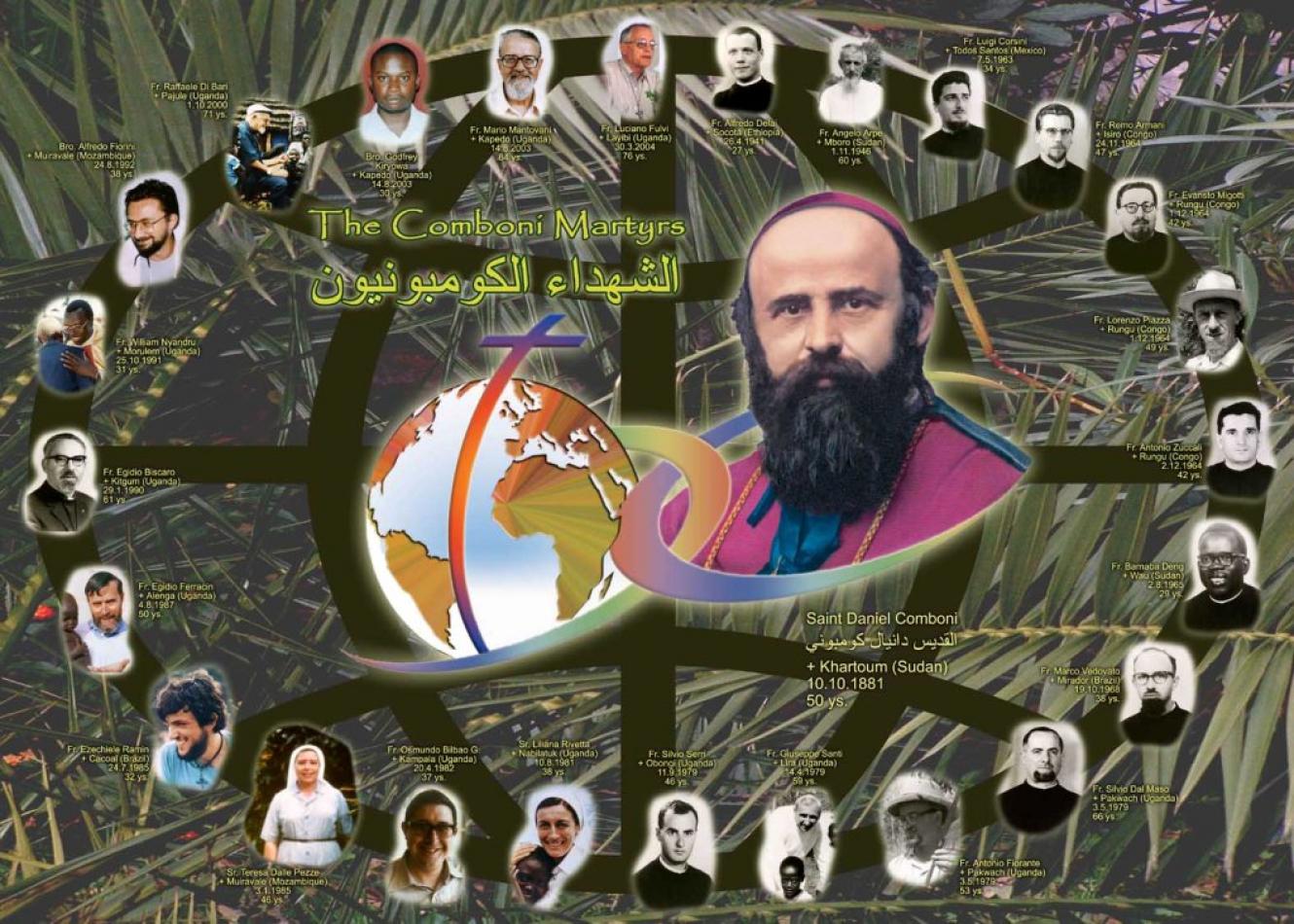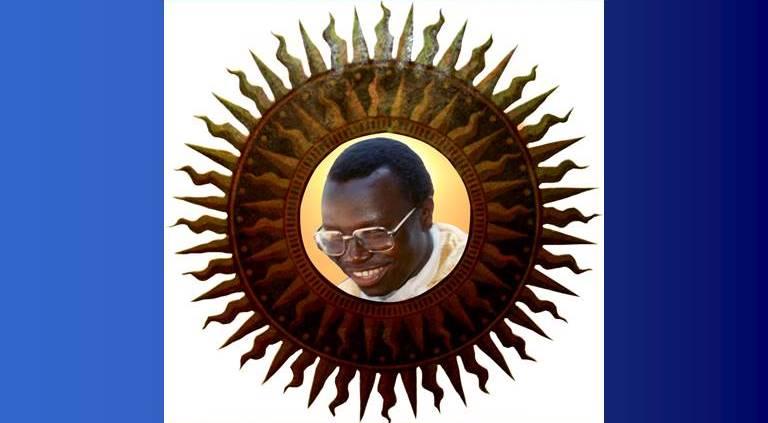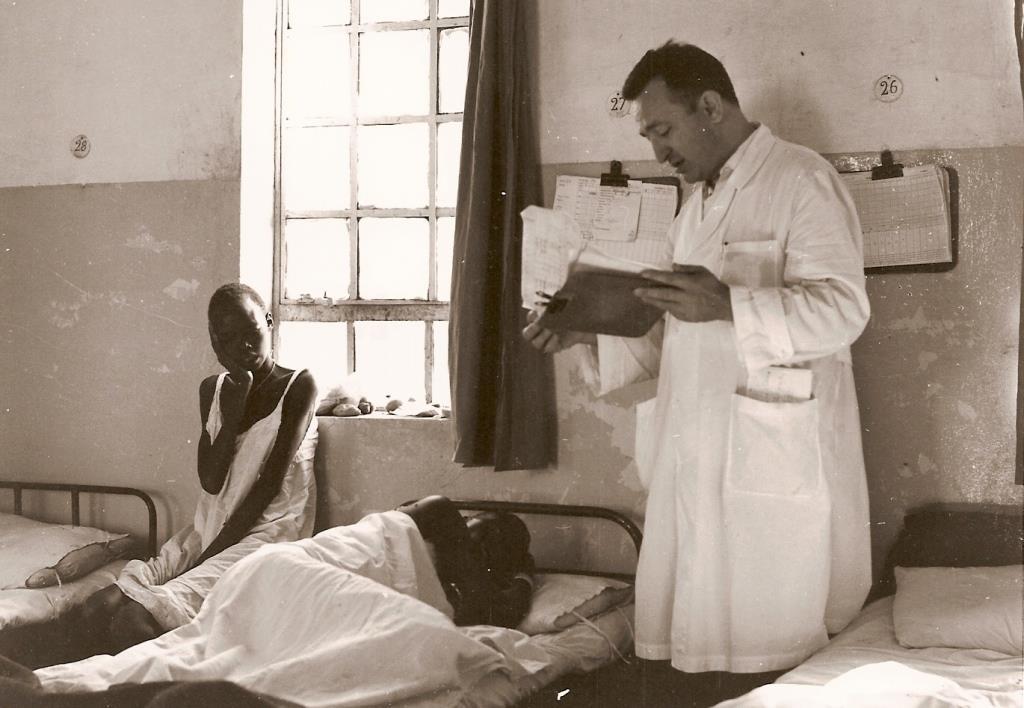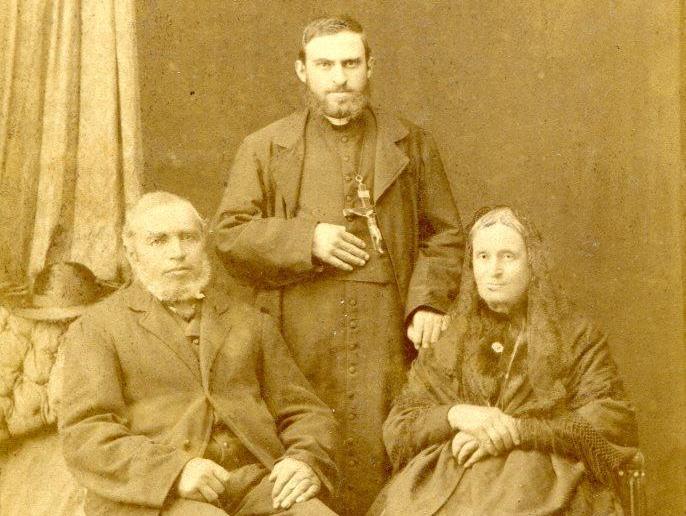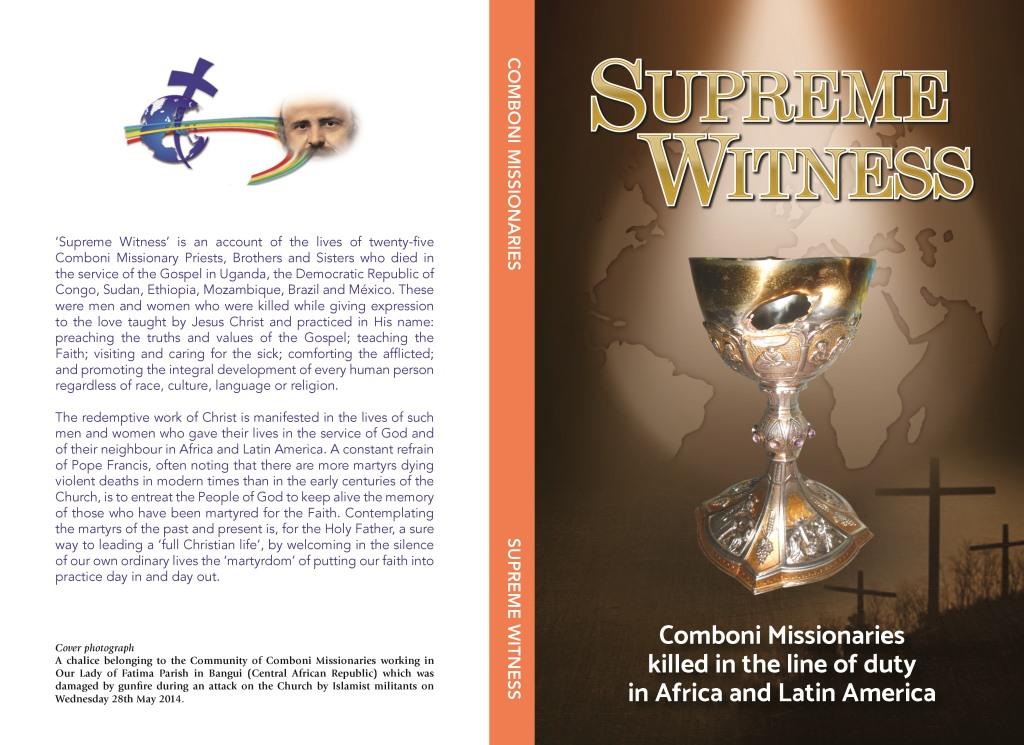Daniel Comboni
Comboni Missionare
Institutioneller Bereich
Andere Links
Newsletter
Monday, February 24, 2020
“Supreme Witness” is an account of the lives of twenty-five Comboni Missionary Priests, Brothers and Sisters who died in the service of the Gospel in Uganda, the Democratic Republic of Congo, Sudan, Ethiopia, Mozambique, Brazil and México. These were men and women who were killed while giving expression to the love taught by Jesus Christ and practiced in His name: preaching the truths and values of the Gospel; teaching the Faith; visiting and caring for the sick; comforting the afflicted; and promoting the integral development of every human person regardless of race, culture, language or religion. (Click here to read or download the book).
The redemptive work of Christ is manifested in the lives of such men and women who gave their lives in the service of God and of their neighbour in Africa and Latin America. A constant refrain of Pope Francis, often noting that there are more martyrs dying violent deaths in modern times than in the early centuries of the Church, is to entreat the People of God to keep alive the memory of those who have been martyred for the Faith. Contemplating the martyrs of the past and present is, for the Holy Father, a sure way to leading a ‘full Christian life’, by welcoming in the silence of our own ordinary lives the ‘martyrdom’ of putting our faith into practice day in and day out.
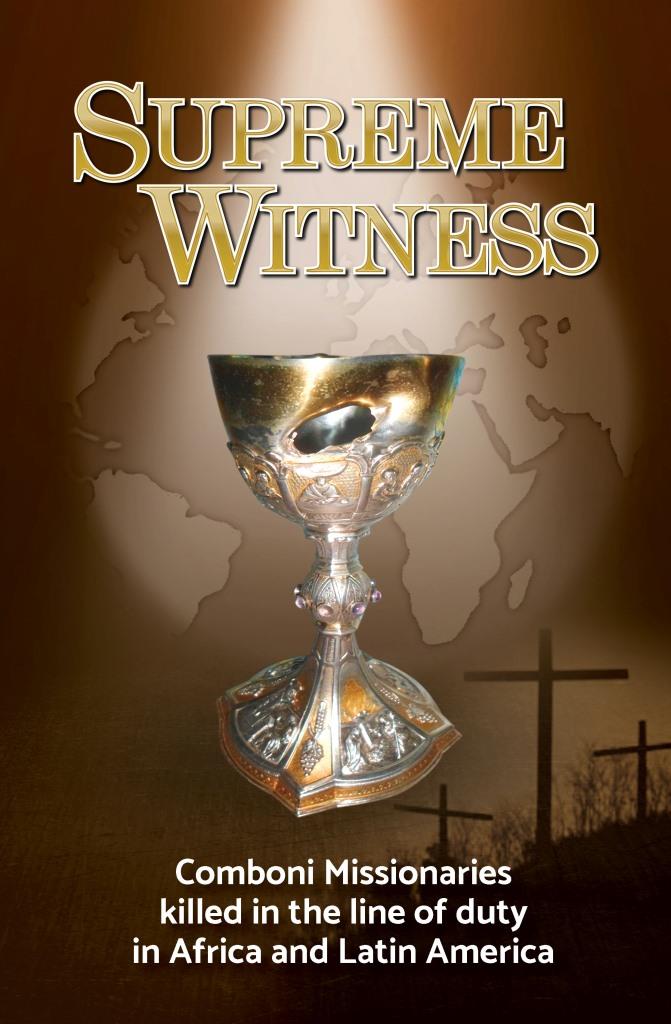
working in Our Lady of Fatima Parish in Bangui (Central African Republic) which was damaged
by gunfire during an attack on the Church by Islamist militants on Wednesday 28th May 2014.
“Sanguis martyrum, semen christianorum”
The blood of Martyrs is the seed of the Church
Tertullian of Carthage (155 – 240 AD)
If Saint Daniel Comboni (1831–1881), Bishop of Khartoum and Founder of the Comboni Missionaries and the Comboni Missionary Sisters, had lived a little longer he would have witnessed the tremendous trials to which his followers in Sudan were subjected during the ‘Mahdist War’. In March 1882 the Sudanese religious leader Muhammad Ahmad bin Abd Allah proclaimed himself the ‘Mahdi’ (‘Guide’) of Islam and led an armed rebellion against the forces of the Turco-Egyptian Government in Sudan. It was the start of an ‘Islamic Revolution’ that would last until September 1898 with the defeat of the Mahdist Army at the Battle of Omdurman by an Anglo-Egyptian Expeditionary Force led by General Herbert Kitchener.
These years marked a most difficult period in the history of the Church in Sudan and in the lives of some of the first Comboni Missionary Priests, Brothers and Sisters. The three Missions founded by Bishop Daniel Comboni in Sudan, Khartoum, El Obeid and Delen, were all destroyed and fourteen of his Missionaries taken prisoner by the Mahdi. The terrible suffering which these Missionaries of Comboni, so deeply signed by the Cross, endured for the sake of remaining faithful to their missionary vocation was truly exemplary. Father Leon Hanriot, who managed with the other Missionaries of Comboni in Khartoum to escape to Cairo before the advancing Mahdist rebels, gave them the title, “Apostles and Confessors of the Faith” and deservedly so.
Under the Mahdiya
At the beginning of May 1882 the town of Delen was cut off by Mahdist forces and the model village of Malbes founded by Bishop Comboni was devastated and abandoned. The Mission of Delen was over-run by Mahdist rebels on September 15th 1882. Father Luigi Bonomi, Father Josef Ohrwalder, Brother Gabriele Mariani, Brother Giuseppe Regnotto, Sister Amalia Andreis, Sister Maria Caprini and Sister Eulalia Pesavento were all taken captive. The ill-treatment, physical violence and hunger in captivity took their toll, and three of the seven Missionaries captured in Delen were dead within weeks of their being taken prisoner. Sister Eulalia Pesavento died on October 27th 1882 at just twenty-six, Brother Gabriele Mariani on October 31st 1882 at twenty-nine and Sister Amalia Andreis on November 11th at thirty years of age.
The Mahdists had laid siege to El Obeid on September 9th 1882, and the Missionaries there took refuge in the ‘Mudiria’ (‘Fort’) along with the other inhabitants of the town. The conditions in the fort became increasingly dire and Father Giovanni Losi died from scurvy at forty-four years of age on December 27th 1882. The garrison and the townspeople were starved into submission after a siege lasting four months. When El Obeid fell into the hands of the rebels on January 19th 1883, Father Paolo Rosignoli, Brother Isidoro Locatelli, Sister Teresa Grigolini, Sister Concetta Corsi, Sister Fortunata Quascé, Sister Elisabetta Venturini and Sister Caterina Chincarini, were all taken captive. For the eleven Missionaries of Comboni in captivity, this was the beginning of a long and slow martyrdom under the tyranny of the Mahdi that was destined to go on for years. Isolated from one another, these were years filled with deprivation, humiliation and suffering of every kind for the Faith. The fierce pressure on the Missionaries to convert to Islam was relentless, and was often accompanied by extreme violence (on one occasion Father Bonomi was bound, tied to the tail of a camel and dragged through the streets of El Obeid for refusing to renounce the Faith). The summary executions for failing to renounce their Faith and embrace Islam, although often threatened, were never actually carried out as the Mahdi preferred to keep the prisoners as hostages to serve as potential ‘bargaining chips’ in any future negotiations with the AngloEgyptian Government in Cairo.
Escape from torment
Father Luigi Bonomi was the first to escape at the end of June 1885 and then, at the end of October of the same year, Sister Maria Caprini and Sister Fortunata Quascé managed to flee their captors and travel to Egypt. Brother Isidoro Locatelli escaped and arrived in the Government-held port city of Sawakin in North-eastern Sudan on March 24th 1887. Sister Concetta Corsi died of typhus on the morning of October 3rd 1891 in Omdurman at forty-one years of age while still a prisoner of the Madhi. On December 8th 1891 Father Josef Ohrwalder, Sister Caterina Chincarini and Sister Elizabetta Venturini reached Egypt, physically and mentally exhausted, but finally free after ten years of harsh imprisonment. Father Paolo Rosignoli was liberated in October 1894 after twelve years of being held prisoner through the sustained efforts of the successor of Comboni, Bishop Francesco Sogaro. After the fall of Omdurman in 1898, Sister Teresa Grigolini and Brother Giuseppe Regnotto, the last of the Missionaries of Comboni to be held in captivity, were freed by the Anglo-Egyptian Expeditionary Force led by General Kitchener.
Ready to die
The Cross is part and parcel of every Christian vocation. For each Christian, the sharing in the Cross of Christ takes on a different form. For some, the identification with Christ’s sufferings reaches the point of giving their lives as in the case of those Comboni Missionaries who wished to remain faithful to their missionary vocation ‘until death’ as taught by their Father and Founder, St. Daniel Comboni.
The following is an account of the lives of twenty-five Comboni Missionary Priests, Brothers and Sisters who died in the service of the Gospel in Uganda, the Democratic Republic of Congo, Sudan, Ethiopia, Mozambique, Brazil and México. These were men and women who were killed while giving expression to the love taught by Jesus Christ and practiced in His name: preaching the truths and values of the Gospel; teaching the Faith; visiting and caring for the sick; comforting the afflicted; and promoting the integral development of every human person regardless of race, culture, language or religion. In front of their murderers they did not protest or fight back and, given the opportunity, they forgave their killers, reminiscent of the words of the Lord himself on the Cross on Calvary, “Father, forgive them for they know not what they do” (Luke 23:34).
Remembering the martyrs past and present
The redemptive work of Christ is manifested in the lives of such men and women who gave their lives in the service of God and of their neighbour in Africa and Latin America. A constant refrain of Pope Francis, often noting that there are more martyrs dying violent deaths in modern times than in the early centuries of the Church, is to entreat the People of God to keep alive the memory of those who have been martyred for the Faith. Contemplating the martyrs of the past and present is, for the Holy Father, a sure way to leading a ‘full Christian life’, by welcoming in the silence of our own ordinary lives the ‘martyrdom’ of putting our faith into practice day in and day out.
Father Martin Devenish mccj
Provincial Superior

